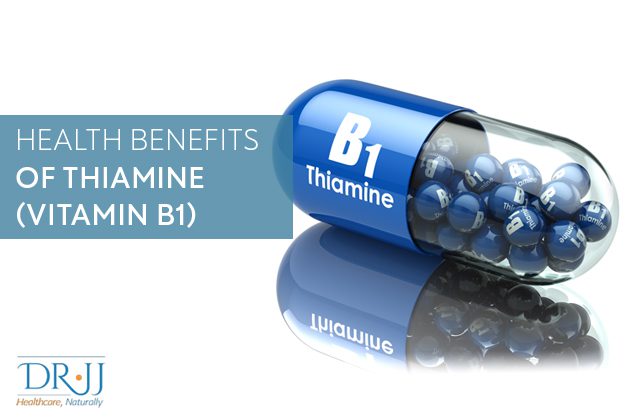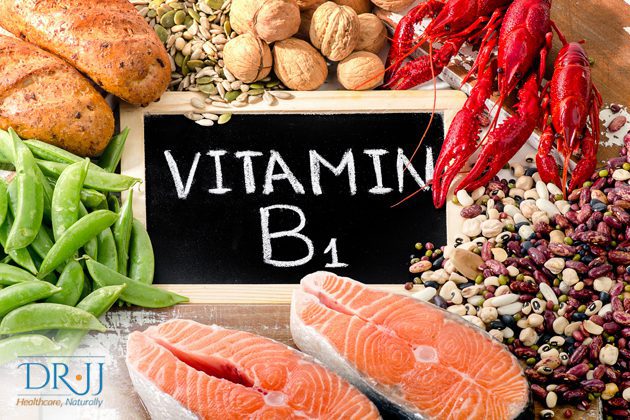
Thiamine is an essential nutrient your body needs in order to function.
It helps your body in a number ways and is abundantly found in many different food sources.
You can also find it in supplements and added to fortified food items in most developed countries.
Because of this, a deficiency is very rare.
But, it’s possible for you to experience symptoms without being clinically deficient.
This is where a naturopathic doctor like me, Dr. JJ, comes in.
I’m a naturopathic doctor based in Toronto that will create a treatment plan to fit your individual needs.
This means helping you to determine how much thiamine, and other nutrients, you need to operate at your best.
This is part of an ongoing series of articles looking at the benefits of different nutrients.
So far, we’ve covered vitamin C, pyridoxine (vitamin B6), biotin (vitamin B7), selenium, magnesium, and plenty more.
RELATED: The Basics On Vitamins
Today, it’s thiamine’s turn in the spotlight.
What Is Thiamine?
Thiamine, also known as vitamin B1, is an essential, water soluble, nutrient.
You can find it in food, supplements, and even in multivitamins.
Your body uses thiamine to create adenosine triphosphate, or ATP.
ATP is the molecule that transports energy within your cells, so it’s pretty important.
It also has other functions, which we’ll take a closer look at below.
Dietary Sources Of Thiamine
You can find thiamine in many different dietary sources.
You can find thiamine naturally in:
- Peas
- Pork
- Poultry
- Nuts
- Soybeans
- Legumes
- Dried beans
In North America, many products like cereal, bread, rice, and pasta are often fortified with thiamine.
This is why a vitamin B1 deficiency is rare here.
But, it’s worth pointing out that certain foods can interfere with your body’s ability to use thiamine.
This can potentially contribute to a deficiency.
Some things to watch out for are:
- Chewing tea leaves and betel nuts
- Consistently eating large amounts of raw fish and shellfish
- Drinking large amounts of tea or coffee (even decaf)
Thiamine Benefits
Thiamine is an important nutrient for keeping your body running in top form.
Below, we’ll take a look at some of the reasons why.
1. It’s Good For Your Metabolism
We talked above about your body needing thiamine to make ATP.
But beyond that, it also plays a role in converting carbs into glucose.
You may have heard about glucose in relation to type 2 diabetes, so it might seem like a bad thing.
And yes, too much glucose over a sustained period is not healthy.
But your body uses glucose as an energy source, so it’s actually important.
Speaking of which…
2. It Can Help Manage Type 2 Diabetes
If you have type 2 diabetes, you’re at greater risk for thiamine deficiency.
A 2013 study by Shahmiri, Soares, Zhao, and Sherriff, found that high dose supplementing of thiamine in people with diabetes or hyperglycemia (prediabetes) helped reduce their symptoms.
They also found it could reduce the likelihood of prediabetes progressing into full blown diabetes.
3. It’s Good For Your Eyes
Thiamine is an important vitamin for your eye health.
By stimulating the back and forth relay of messages between your eyes and brain, thiamine helps to prevent damage from occurring to your optic nerve.
This is helpful for eye conditions like cataracts and glaucoma, where often there is a loss of muscle and nerve signals between your eyes and brain.
This is how thiamine, along with other essential nutrients, helps to prevent both conditions.
4. It Can Relieve Menstrual Pain
Recent research indicates that thiamine can help to relieve menstruation pain.
The exact nature of how thiamine helps, however, is currently unknown.
Right now, the link is that low thiamine levels is associated with muscle pain.
Since your uterus is a muscle, it could be giving you more pain if you don’t have enough thiamine.
Now, this doesn’t mean you have a thiamine deficiency.
I mentioned before that thiamine deficiency is very rare in developed countries.
But you could be short the amount your body needs to function optimally, which means that your uterus struggles during menstruation.
Thiamine is one of many essential nutrients that play a role in menstruation.
Research is currently underway to help us understand more about how this works.
5. It’s Good For Your Heart
Your heart needs thiamine to function properly.
As well, studies have shown thiamine deficiency is more common in people who’ve experienced heart failure.
More research is needed to better understand why this is the case, however.
The studies done haven’t properly accounted for comorbidities, medications, methods of measuring thiamine levels, and other factors.
But the relation is an important one to note.
Can You Overdose On Thiamine?
Thiamine is a water soluble vitamin.
This means your body will use what it needs, and flush everything else out through your urine.
As a result, it’s very difficult to overdose on it.
This is true for other water soluble vitamins as well – the rest of the B complex, and vitamin C.
Contrast this with fat soluble vitamins like vitamin A, vitamin D, or vitamin E – your body stores what it doesn’t use in your fatty tissues.
It’s much easier to overdose on those.
Taking high doses of thiamine, however, may cause digestive issues and headaches.
It’s also a waste of money, since after a certain point your body isn’t able to use what you’re taking in – you’re just creating more expensive urine.
Symptoms Of Thiamine Deficiency?
How do you know if you have a thiamine deficiency?
That can be hard to tell because the usual symptoms are vague and can be attributed to a number of different conditions.
The most common symptoms are:
- Fatigue
- Poor appetite
- Nerve Damage
- Irritability
- Blurry vision
- Nausea or vomiting
- Delirium
Fatigue and irritability are symptoms that while general, have been commonly associated with thiamine deficiency.
Current research suggests healthcare providers should prioritize both as early indicators of thiamine deficiency, especially if you are at risk of it.
Out of all thiamine deficiency symptoms, the most serious are nerve damage and delirium.
This is because both are associated with prolonged and severe thiamine deficiency, which can cause permanent damage to your nerves and brain.
The nerve damage that can result from this prolonged deficiency is called beriberi and in some severe cases can lead to death by heart failure within a few days without treatment.
The brain damage that can result from a prolonged deficiency is called Wernicke-Korsakoff syndrome and it affects your nerves and your brain’s memory function.
Both beriberi and Wernicke-Korsakoff syndrome can be treated with thiamine IV infusion therapy or supplements.
RELATED: IV Therapy Naturopathic Doctor
Should You Supplement With Thiamine?
Most of time, you can get your daily thiamine amounts from your diet.
But, if you’re at greater risk of thiamine deficiency, it can be helpful to supplement.
People with anorexia nervosa, digestive disorders like Crohn’s disease, or alcoholism tend to be at a high risk for developing a thiamine deficiency.
RELATED: Digestive Disorders Naturopathic Doctor
In some cases, thiamine supplements are used to help people experiencing withdrawal from alcohol.
Thiamine supplements have also been used as support for people with Alzheimer’s disease, cataracts, and kidney disease.
Questions? Ask Dr. JJ!
There are many ways that thiamine can help your body.
It’s an essential nutrient that helps your body function at its best, so you can focus on the things that matter the most.
If you’re feeling any unusual symptoms or are worried that you might be thiamine deficiency, ask me, Dr. JJ.
I’ll work with you to get you on the road to recovery with a tailored treatment plan, created just for you.
Book your appointment with me, Dr. JJ, today.
If you have questions about naturopathic medicine, or you’d like to take your first step into the world of naturopathy, contact me, Dr. JJ, and let’s book an appointment.
Yours in health,
Dr. JJ Dugoua, Naturopathic Doctor
600 Sherbourne St, Suite 315,
Toronto, ON M4X 1W4
-https://goo.gl/maps/6VDXwiCihRpDRo5A9
Dr. JJ Dugoua is a naturopathic doctor in Toronto and has a PhD in Pharmaceutical Sciences. His clinic provides solutions for many health concerns and has a special focus on thyroid health issues.



